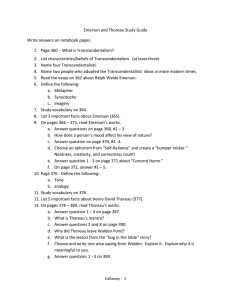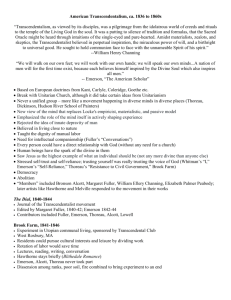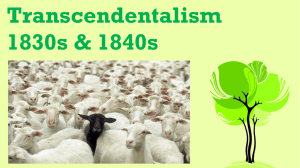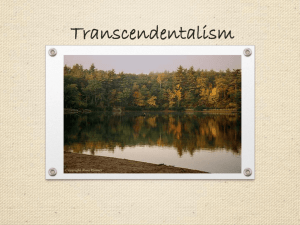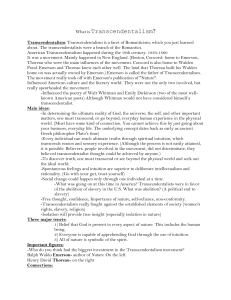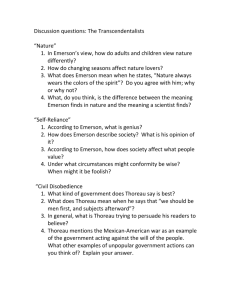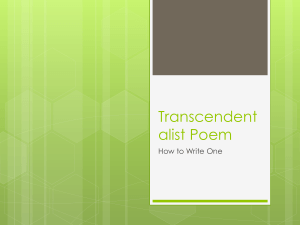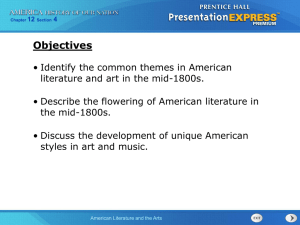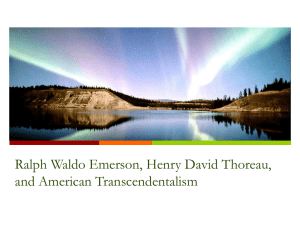R and T
advertisement
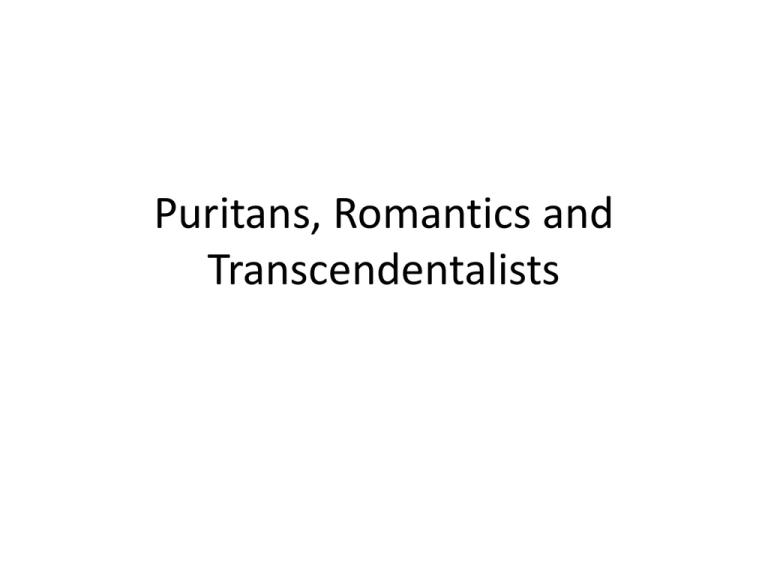
Puritans, Romantics and Transcendentalists Puritanism • “Puritanism. The haunting fear that someone, somewhere, may be happy.” H.L. Mencken • • • • • Major Ideas: Persecuted in England for going against the Protestant church/government Sought to “purify” the church. Religion was an individual, personal, and internal experience. The individual’s relationship with God was not determined by a member of the clergy or the government. Believed that all humans were damned, but that some were meant to be saved. Fate was pre-determined-- one couldn’t “save” oneself, but if one led a good life, one would be able to see the “signs” that meant one were saved Only God’s grace was an individual’s salvation. Contract-based government—beginnings of democracy (Salem Witch Trials) Business was an important part of community, as was education • • • • • Puritan Writing • Bible=model as people searched for connections between their lives and biblical events • Each individual’s life was a spiritual journey, so recorded in diaries and historical documents describing the workings of God. • Known for plain style of writing emphasizing clarity and avoiding complicated figures of speech Puritan Writers • • • • Anne Bradstreet William Bradford Mary Rowlandson Reverend Jonathan Edwards Salem Witch Trials The First Thanksgiving The Romantics Transcendentalism: • Developed in the 1830s both in connection with, and in opposition to Romanticism • Transcendentalism refers to the idea that in finding God, the universe, and the self/soul, one must transcend typical human experience in the physical world •Marked by a “return” to nature, and trust in intuition rather than deliberate rationality and intellectualism Transcendentalism • Believed that self-reliance and individualism must outweigh external authority, and selfimprovement leads to social improvement • Worked to find the “permanent reality that underlies physical appearance” • Optimism about the potential of individual lives and the universe Transcendentalist Humor Famous Transcendentalists • Ralph Waldo Emerson AKA Lead Transcendentalist • Henry David Thoreau AKA neighbor and friend to L.T. • Margret Fuller AKA one of the first major feminist writers in the US • Amos Bronson Alcott AKA father to Louisa May Alcott Henry David Thoreau • 1817-1862, born in Concord, MA. • Went to Harvard, very well-read, but many felt he squandered his talents and connections (including Emerson) • Influenced by Emerson • Went “into the woods” to journey inwards in a T. fashion. Built a small cabin on Emerson’s land two miles from town. Lived there for three years, writing, thinking, and studying life Thoreau • Wrote “Resistance to Civil Government” while on Walden Pond after being arrested for not paying poll tax (supported MexicanAmerican War) because he felt it extended slavery. • Died in 1862. Apparently asked on his deathbed if he’s made peace with God (by his aunt). His reply: “I didn’t know that we had ever quarreled.” Walden Pond Thoreau “Resistance to Civil Government” • Response to being jailed for one night for not paying poll tax • Discusses the role of the individual in society and to his/her government • Employs rhetoric devices of: ethos, logos, pathos • Inspired authors and thinkers like MLK and Gandhi around passive/non-violent resistance Ethos, Logos, Pathos • Ethos is appeal based on the character of the speaker or moral or widely accepted values and/or standards • Logos is appeal based on logic or reason; it uses facts, examples, and well-reasoned arguments. • Pathos: is an appeal based on emotion and language and anecdotes that arouse strong feelings. • http://www.rpi.edu/dept/llc/webclass/web/project1/group4/
